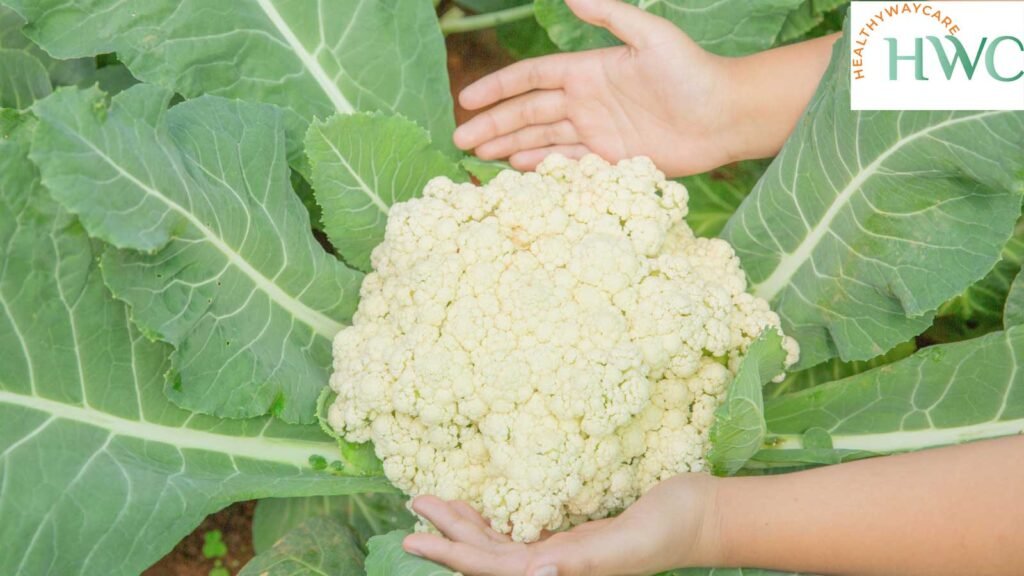Cauliflower health benefits come from its high fiber content, antioxidants, and low-calorie profile that support digestion, weight management, and heart health.
Cauliflower is a low-calorie, nutrient-rich cruciferous vegetable that offers several health benefits. Rich in fiber, vitamins, antioxidants, and plant compounds, cauliflower supports digestive health, weight management, and heart health while fitting easily into most diets.
This article explains cauliflower health benefits, nutritional value, safe intake, and who should be cautious.
Cauliflower Health Benefits
Nutritional Value of Cauliflower
Cauliflower is low in calories but packed with essential nutrients.
Key nutrients in cauliflower include:
- Dietary fiber – supports digestion and gut health
- Vitamin C – boosts immunity and antioxidant protection
- Vitamin K – supports blood clotting and bone health
- Folate – supports cell growth and repair
- Potassium – helps regulate blood pressure
- Choline – supports brain and metabolic health
- Antioxidants – reduce inflammation
Because of this profile, cauliflower is considered a gut-friendly and weight-loss–friendly vegetable.

Cauliflower Health Benefits for Gut Health
One of the main cauliflower health benefits is improved digestion.
🥗 How cauliflower supports gut health:
- Improves bowel regularity
- Helps prevent constipation
- Feeds healthy gut bacteria
- Supports stomach and intestinal lining
The fiber content makes cauliflower beneficial for overall digestive health.
Cauliflower Benefits for Weight Loss
Cauliflower is ideal for people trying to lose or manage weight.
⚖️ Weight management benefits:
- Very low in calories
- High fiber keeps you full longer
- Can replace high-carb foods (rice, flour)
- Helps control appetite
Cauliflower rice and mashed cauliflower are popular low-carb alternatives.
Cauliflower Benefits for Heart Health
Cauliflower supports cardiovascular health in multiple ways.
❤️ Heart health benefits:
- Helps lower bad cholesterol (LDL)
- Supports healthy blood pressure
- Reduces inflammation
- Improves blood vessel function
Fiber and antioxidants play an important role in protecting the heart.
One of the key cauliflower health benefits is its ability to support gut health while helping with healthy weight management.
Is Cauliflower Good for Diabetics?
✔ Yes.
Cauliflower is low in carbohydrates and has a low glycemic index, making it suitable for people with diabetes when cooked properly.
Who Should Be Careful with Cauliflower?
Despite its benefits, some people should limit intake.
⚠️ Thyroid Disorders
- Cauliflower contains goitrogens
- Excess raw intake may interfere with thyroid function
⚠️ Digestive Sensitivity
- May cause gas or bloating if overeaten
⚠️ Blood Thinners
- High vitamin K may affect blood-thinning medications
To understand how nutrients support overall health, read our guide on
what are vitamins and how they work.
How Much Cauliflower Is Safe Per Day?
Recommended intake:
- 1 cup cooked cauliflower OR 1–2 cups raw cauliflower per day
Light cooking improves digestion and reduces gas.
Best Ways to Eat Cauliflower
To maximize cauliflower health benefits:
✔ Lightly steamed or sautéed cauliflower
✔ Add to curries, soups, or stir-fries
✔ Use as rice or flour substitute
✔ Combine with spices like turmeric and garlic
❌ Avoid deep-fried cauliflower regularly
❌ Avoid excessive raw cauliflower daily
You may also explore
broccoli health benefits
for other cruciferous vegetables.
Side Effects of Excess Cauliflower Consumption
- Bloating or gas
- Digestive discomfort
- Thyroid interference (rare, excessive raw intake)
Moderation is important.
According to the National Institutes of Health, cruciferous vegetables like cauliflower support digestion, heart health, and disease prevention.
Frequently Asked Questions (FAQs)
Is cauliflower good for digestion?
Yes. Cauliflower supports gut health due to its fiber content.
Can kidney patients eat cauliflower?
Yes, in moderation. Cauliflower is relatively low in potassium.
Is cauliflower better cooked or raw?
Lightly cooked cauliflower is easier to digest.
Can cauliflower be eaten daily?
Yes, in moderate amounts.
Conclusion
Cauliflower is a versatile and nutritious vegetable that supports gut health, weight loss, and heart health. The cauliflower health benefits come from its fiber, antioxidants, and low-calorie profile.
When consumed in moderation and prepared properly, cauliflower can be a valuable part of a healthy diet. People with thyroid disorders or digestive sensitivity should consult a healthcare professional before excessive intake.
⚠️ Medical Disclaimer
The information provided in this article is for educational and informational purposes only and should not be considered medical advice. Cauliflower health benefits discussed here are based on general nutrition research.
This content is not intended to diagnose, treat, cure, or prevent any disease. Always consult a qualified doctor or dietitian before making dietary changes, especially if you have thyroid disorders, digestive issues, or are taking medications.

